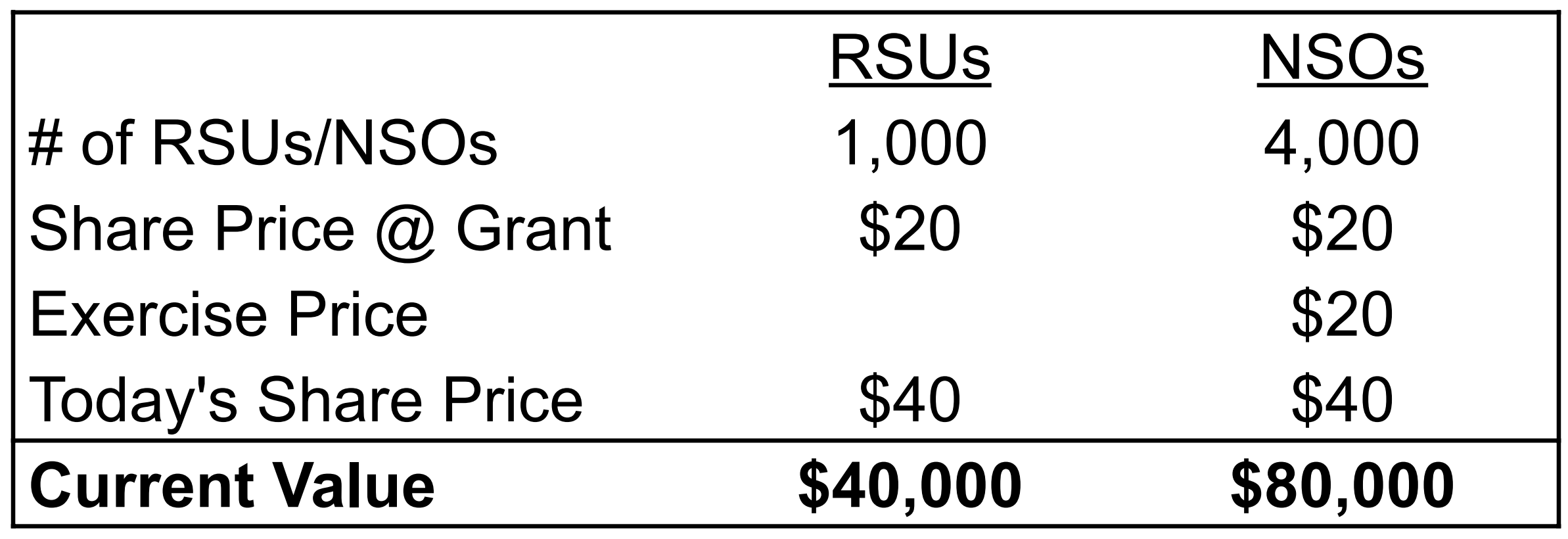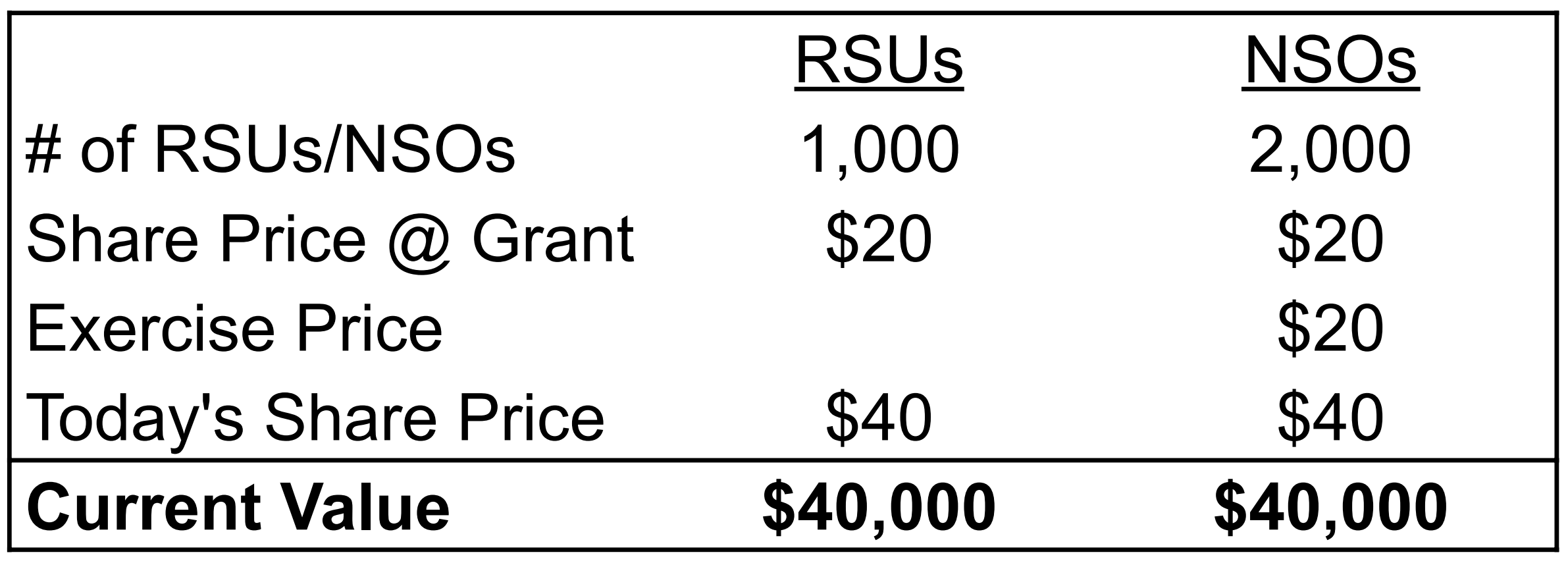What’s Better RSUs or Options?
Given that we write mostly about equity compensation, people often ask the question, “What’s better, Restricted Stock Units (RSUs) or stock options? As with a lot of things in personal finance the answer is almost always, “It depends.”
Although that may seem like a non-answer, the reality is that there are only so many possibilities that can play out. And if you understand all of the possibilities, you can know when RSUs are best and when stock options are best.
In this article we’ll define which RSUs and which options we’re talking about and then we’ll dive into the possibilities so you can make an informed decision on what might be best for you.
Defining RSUs and Stock Options
In the case of RSUs and Stock options, there are two primary types for each.
With RSUs, there are (1) standard single-trigger RSUs offered at public companies and (2) double-trigger RSUs offered by private companies.
With Stock Options, there are (1) Incentive Stock Options (ISOs) which are most commonly granted by smaller, non-public companies and (2) Nonqualified Stock Options (NSOs) which can be granted by both smaller start-ups and large companies that are publicly traded.
In this article, we’re going to discuss RSUs and NSOs at publicly traded companies.
When RSUs are Better Than Stock Options
There are situations in which RSUs can be better than NSOs and others in which NSOs can be better than RSUs. We’ll begin with a discussion of when RSUs are better than NSOs.
When the stock price goes down after grant
If you receive RSUs and NSOs on the same day, and the price only goes down from that moment, your RSUs will always be more valuable than your NSOs.
This happens because NSOs give you the right to purchase company stock at a certain price. The only way you can profit from an NSO is if the value of the company goes up above your exercise/strike price. If the value drops below your exercise price, your NSOs are considered underwater NSOs. And until your underwater NSOs become more valuable than the exercise price, they’ll be worthless.
RSUs on the other hand will retain some value unless the company goes bankrupt. Here’s an example.
As you can see in the example above, even if the share price of the company goes from $20 down to $15, the RSUs will still have some value. The NSOs on the other hand will only have the future hope that they’ll be worth something.
In our opinion, this is a benefit of RSUs that is frequently underappreciated.
You would receive an equal number or RSUs and NSOs
If you receive one RSU and one NSO, the math makes it nearly impossible for the stock option to ever be worth more than the RSU. Because NSOs have an exercise price attached to them and RSUs don’t, your RSUs will be more valuable by whatever the exercise price of the NSOs is.
Let’s look at another example, only this time with a little bigger numbers.
As you can see from the example above, even if the price of the company goes from $20 to $30, the NSOs will still be worth $20,000 less because you have to pay $20,000 to exercise your NSOs.
When Stock Options are Better than RSUs
Now that we’ve covered when RSUs are better than NSOs, it’s time to review when NSOs are better than RSUs.
You receive more stock options than RSUs
The most common way NSOs outperform RSUs is if you receive 2, 4, or some large multiple more of NSOs than RSUs.
Companies like Nike and Spotify let employees choose a portion of their compensation. Employees can choose RSUs or some multiple of NSOs (e.g. 4 NSOs for every 1 RSU in the case of Spotify’s Incentive Mix program).
NSOs are also commonly granted to executives at public companies. This is because NSOs are worthless if the stock price drops, but serve to reward the executives if the stock price goes up.
This still doesn’t guarantee that NSOs will outperform RSUs, but it can be more rewarding if there are big jumps in value - especially if you’re receiving a lot of NSOs.
Here’s an example showing the impact receiving 4 NSOs for every 1 RSU can have.
In the example above, we’re comparing 1,000 RSUs to 4,000 NSOs. As you can see, if the price jumps to $40, you’d make $40,000 more with NSOs than RSUs. This growth continues so long as the price of the company goes up
The smaller the ratio of NSOs to RSUs you receive, the larger the increase in price that will be required for NSOs to be the better option (hehe). Here’s another example with 2,000 NSOs.
As you can see the decision to receive 2 NSOs instead of 1 RSU is equivalent at $40, but every penny above $40 NSOs will have been the better choice. By receiving multiple more NSOs to RSUs, your bet has a compounding effect if the stock price goes up signifcantly.
You have the ability to early exercise NSOs
As we teased in the RSU section, NSOs can be better than RSUs provided that you do some advanced planning and get lucky with price appreciation.
If you have the ability to early exercise NSOs, you can exercise your NSOs at roughly the same time as your grant date, and file what’s called an 83(b) election with the IRS. From this moment forward, you start the clock on long-term capital gains.
This can be beneficial because taxes from capital gains are more favorable than taxes from ordinary income (which is what you get from exercising NSOs and having RSUs vest).
If you receive long-term capital gains treatment instead of ordinary income treatment, the tax benefit can range anywhere from 9% to 13%.
All this said, the odds of your tax savings from receiving long-term capital gains treatment tipping the scales in favor of NSOs is highly unlikely and in our opinion, not worth the risk.
Thoughts On Whether RSUs or Stock Options Are Better?
As we mentioned in the introduction, whether RSUs or Stock Options are better is based upon your individual situation. Whether your company is public or private makes a huge difference as well.
If you’re offered one-to-one NSOs to RSUs at a public company, we nearly always recommend taking the RSUs. However, if you’re at a private company, the conversation changes significantly and the decision is not as cut and dry.
If you’re offered two-to-one, three-to-one, four-to-one+ NSOs to RSUs at a public company, the decision comes down to how much you think the company is going to appreciate in the coming years. The higher the multiplier, the more enticing it is to take the bet that the company is going to go up in value.
If you are the type of person who wants more stability, you’ll probably feel better about choosing RSUs since they’ll retain some value as long as the company doesn’t go out of business.
If you’re given a decent multiplier on your NSOs, then you’ll want to evaluate whether your personal situation can handle the added risk or if you’re better off playing it safe.
Because it’s impossible to perfectly predict the future, no matter what you decide you’re probably always going to be a little unhappy with your decision.
As always, if you have any questions or would like to discuss your own situation, we’re happy to chat. Please reach out at team@equityftw.com.






